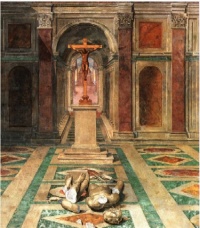Belief
From The Art and Popular Culture Encyclopedia
|
"Why, sometimes I've believed as many as six impossible things before breakfast." --Through the Looking-Glass |

|
Related e |
|
Featured: |
Belief is the state of mind in which a person thinks something to be the case regardless of empirical evidence to prove that something is the case with factual certainty. Another way of defining belief sees it as a mental representation of an attitude positively oriented towards the likelihood of something being true. In the context of Ancient Greek thought, two related concepts were identified with regards to the concept of belief: pistis and doxa. Simplified, we may say that pistis refers to "trust" and "confidence", while doxa refers to "opinion" and "acceptance". The English word "orthodoxy" derives from doxa. Jonathan Leicester suggests that belief has the purpose of guiding action rather than indicating truth.
In epistemology, philosophers use the term "belief" to refer to personal attitudes associated with true or false ideas and concepts. However, "belief" does not require active introspection and circumspection. For example, we never ponder whether or not the sun will rise. We simply assume the sun will rise. Since "belief" is an important aspect of mundane life, according to Eric Schwitzgebel in the Stanford Encyclopedia of Philosophy, a related question asks: "how a physical organism can have beliefs?"
See also
- Charm
- Cognitive dissonance
- Collective belief
- Conversational intolerance (Sam Harris)
- Culture-specific syndrome
- Delusion
- Doxastic logic
- Evil eye
- Expectation
- Faith
- Folk psychology
- Gettier problem
- Idea
- Life stance
- Moore's paradox
- Nocebo
- Observer-expectancy effect
- Opinion
- Placebo
- Propositional attitude
- Propositional knowledge
- Psychosomatic illness
- Religion
- Self-deception
- Spell (paranormal)
- Spirituality
- Subject-expectancy effect
- Sugar pill
- Suggestibility
- Suggestion
- Subjective validation
- Truth
- Thomas theorem
- Ultimate importance
- Unbelieving
- Unintended consequence
- Value (personal and cultural)
- List of sociology topics
- Sociology

